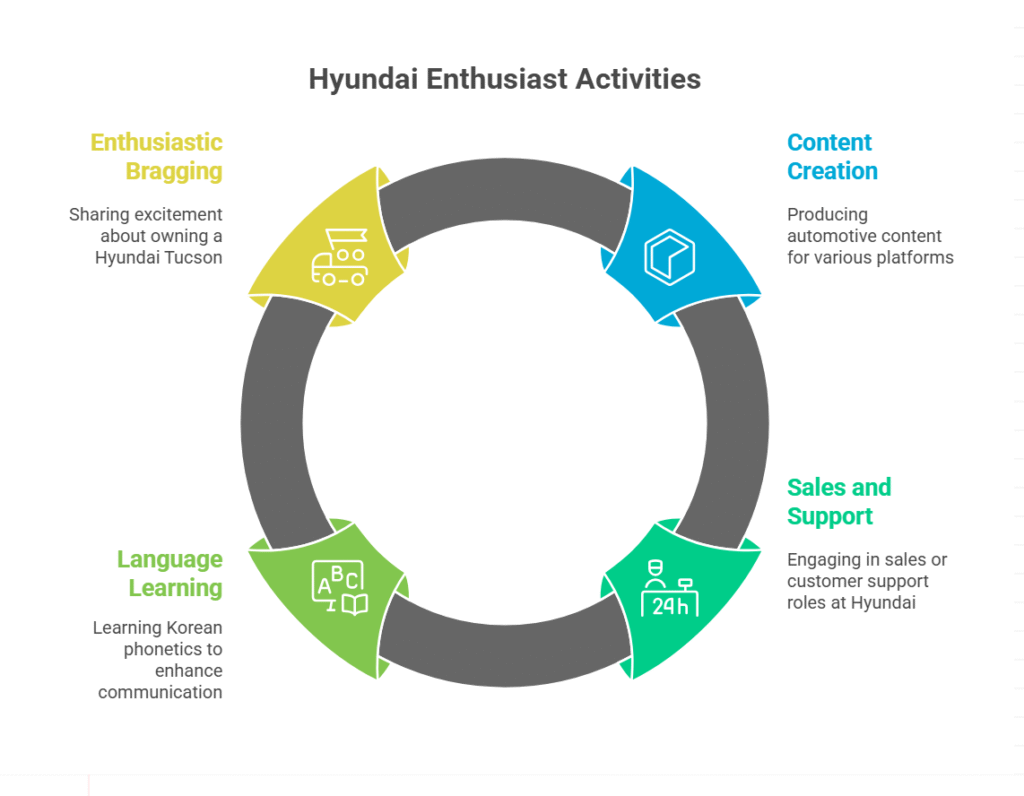Hyundai pronunciation? It all boils down to linguistics. The word “Hyundai” (현대) is Korean, and Korean phonetics don’t directly translate to English sounds. In Korean:
- “Hyun” (현대) means “modern.”
- “Dai” (대) means “era” or “generation.”
Put together, Hyundai literally translates to “modern era.” Simple, right? Yet, for English speakers, the combination of sounds is unfamiliar. The “H” is softer (almost silent), the “y” blends into a “j” sound, and that “dai” doesn’t quite roll off the tongue like “day” in English. No wonder people fumble with how do you pronounce Hyundai!
The Correct Hyundai Pronunciation Breakdown
Ready for the magic fix? Here’s the phonetic breakdown:
Hyundai = “Hun-day” (almost!)
The real pronunciation is closer to “Hyun-day” (hʌnˈdeɪ). Let’s dissect it:
- “Hyun” sounds like “huhn” with a soft “h.” Imagine whispering “hun” but with a hint of an “h” at the start.
Don’t say “HIGH-oon”; that’s way off - “Dai” rhymes with “day,” but start it with a gentle “d,” almost like “deh.”
Avoid “die” or “dye” – Hyundai isn’t a eulogy or a hair product
Put them together: “Huhn-day.”
Practice this 5 times in front of a mirror. Trust me, you’ll nail it.
Real Talk: Even Experts Get It Wrong (At First)
“I used to say ‘Hyun-DEE’ for years until I visited the Hyundai headquarters in Seoul. The locals laughed kindly and corrected me to ‘HUN-day.’ Now, I’m the pronunciation police at car meets!”
– Alex, automotive blogger
Sound familiar? Even enthusiasts and industry insiders stumble. But once you know how to say Hyundai correctly, it’s liberating. No more side-eye from car aficionados!
Common Mispronunciations: What NOT to Do
Let’s address the elephants in the room. Here are the most common slip-ups:
| Mispronunciation | What People Think | The Reality |
|---|---|---|
| “High-UN-die” | Sounds fancy | Totally off-track |
| “Hun-DEE” | Overemphasizes “dee” | Wrong stress |
| “Hyoo-NAY” | French vibes, anyone? | Hyundai isn’t Parisian |
The key? Soft “h” + stress on “day.”
Repeat after me: “Huhn-day, Huhn-day, Huhn-day.” You’re getting the hang of it!
Why Mastering Hyundai Pronunciation Matters in 2025
Here’s the thing: in today’s digital age, pronunciation credibility is real. Whether you’re:
- Creating automotive content (YouTube, podcasts, blogs)
- Working in sales or customer support for Hyundai
- A language learner tackling Korean phonetics
- Simply a car enthusiast bragging about your Hyundai Tucson
Getting Hyundai pronunciation right boosts your confidence and authority. Imagine reading aloud from a script: “The all-new Hyundai Santa Fe offers…” – smooth, effortless, respected.

How Technology Helps (or Hinders) Your Hyundai Pronunciation
In 2025, we’ve got AI-powered pronunciation tools like:
- Forvo (native speaker recordings)
- Google Translate’s speech feature
- Speechify (text-to-speech with accents)
These tools are lifesavers, but here’s the catch: they sometimes overemphasize sounds. A robot saying “HIGH-UN-dai” with dramatic flair won’t help. Instead:
- Listen to native Koreans pronounce Hyundai on Forvo.
- Mimic the soft “h” and natural flow.
- Record yourself. Does it sound close?
The Pros and Cons of Focusing on Hyundai Pronunciation
Let’s weigh the benefits and “so what?” moments:
Pros:
Boosts credibility (car blogs, vlogs, sales pitches)
Improves your Korean language skills (bonus points!)
Earns respect from multilingual communities
Cons:
Initial awkwardness (we’ve all been there )
Time spent practicing (but it’s worth it)
In short, the pros far outweigh the cons. Trust me, your future self (and your Hyundai-fan friends) will thank you.
Frequently Asked Questions
Q1: How do you pronounce Hyundai in Korean?
A: In Korean, it’s pronounced with a soft “h” sound, almost like “Hyoondae” (hʌnˈdeɪ). The “Hyun” part uses a unique vowel sound not found in English, but “Huhn-day” is the closest Western adaptation.
Q2: Is it “Hun-day” or “Hyun-day”?
A: Technically, it’s “Hyun-day” with that soft “h.” “Hun-day” is an acceptable anglicized version, but if you want to impress Koreans, lean into the “y” sound subtly. Think of it like “h(y)un-day.”
Q3: Why do Americans struggle with Hyundai pronunciation?
A: Americans (and many English speakers) default to hard consonants and familiar sounds. Korean phonetics use aspirated sounds (soft hisses) and tonal variations that don’t exist in English. It’s like learning a mini-phonetic dance – but doable!
Q4: Does Hyundai pronunciation matter for branding?
A: Absolutely! Brands invest millions in name recognition. Mispronouncing Hyundai subtly signals “I don’t care about the brand’s heritage.” On the flip side, saying it right shows respect for the culture and the engineering excellence behind Hyundai cars.
CONCLUSION
By now, you’re not just familiar with Hyundai pronunciation – you’re a pro. Remember:
- Start soft with “huhn”
- Roll into “day” with confidence
- Practice with native speakers (Forvo is your friend)
CLICK HERE FOR MORE BLOG POSTS
John Authers is a seasoned and respected writer whose work reflects the tone, clarity, and emotional intelligence that readers value in 2025. His writing blends deep insight with a natural, human voice—making complex ideas feel relatable and engaging. Every piece he crafts feels thoughtful, original, and genuinely worth reading.

